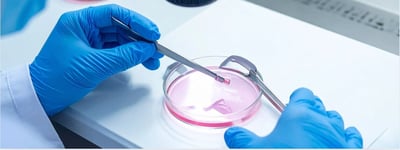.jpg)
April 21, 2017
Fertility and age: knowing where you stand
There is no denying that the age in which women are having their first baby has and continues to rise due to a variety of reasons, these include women wanting to pursue careers, educational opportunities, as well as the high cost of housing and other complex social issues. And, it is unlikely that this trend of delaying parenthood is going to change anytime soon. But what can you do to assess your fertility health, what really are your chances of having a baby in your late 30s and is there anything you can do to preserve your fertility?
Here we talk to Harley Street Fertility Clinic Director, Dr Venkat about the common issues with age and fertility:
The key to fertility is a woman’s ovarian reserve ie. the availability of healthy eggs. A decline in ‘ovarian reserve’ means that not only do the ovaries have fewer eggs to offer, but the eggs they do have are of poorer quality. The challenge for many women choosing to have their first child mid-30s or later is that as part of the body’s natural aging process, a woman’s eggs age too. This can lead to infertility and/or miscarriage.
Achieving a natural pregnancy after 40 years of age is a challenge for many women, but getting pregnant is only half the journey. Miscarriage rates over 40 are 50% and rise quickly with each advancing year.
At the Harley Street Fertility Clinic, we use a number of methods to evaluate a woman’s fertility health. It really is crucial to undergo fertility health-checks in order to know where you stand and if you need to take steps to preserve your fertility (such as egg freezing) for the future.
- Hormone testing to assess egg quality and number
Three simple blood tests can check hormone levels and reveal more information about egg quality and number. These tests may also help diagnose infertility in a younger woman, who ordinarily would not be experiencing diminished ovarian reserve or poor quality, but may be living with an undiagnosed condition:
- Basal FSH: FSH (follicle stimulating hormone) is the main hormone involved in producing mature eggs in the ovaries. If this test reveals excessive levels of FSH in the body, it is a signal that the brain is trying to boost poorly performing ovaries into action. In other words, the ovaries may need extra help to make eggs.
- Estradiol: Estradiol is the most important form of oestrogen found in the body, and is responsible for maintaining healthy eggs in a woman’s ovaries, as well as for facilitating a healthy pregnancy. If a blood test shows high levels of Estradiol, it indicates a problem with egg numbers and/or quality.
- Anti-mullerian hormone (AMH): AMH is a blood test that directly measures ovarian reserve. It is produced directly by early stage ovarian follicles. High levels (over 1.0 ng/mL or 8 pmol/L) are favourable, while low levels (less than 1.0 ng/mL or 8 pmol/L) indicate decreased ovarian reserve. AMH may be the best measure of the menopausal transition and ovarian age.
- Ultrasound evaluation to assess egg quantity
An ultrasound allows us to evaluate the uterus, uterine cavity, and ovaries. We recommend that this scan is performed just prior to ovulation - from this we can make sure there are no fibroids or other growths that could affect fertility, as well as assessing the number of small follicles (antral follicles) in the ovaries, referred to as an antral follicle count (AFC). These give us a good indication of the ovarian reserve.
At the end of the day, knowledge and education is key! If parenthood isn’t an option until a person’s late 30s/early 40s then why not consider egg or sperm freezing to increase the chance of having your own ‘genetic’ child at a later stage in life. For more information about a fertility health-check contact the Clinic by emailing: info@hsfc.org.uk or call 020 7436 6838.
.jpg?upsize=true&upscale=true&width=400&height=200&name=Untitled%20design%20(1).jpg)

